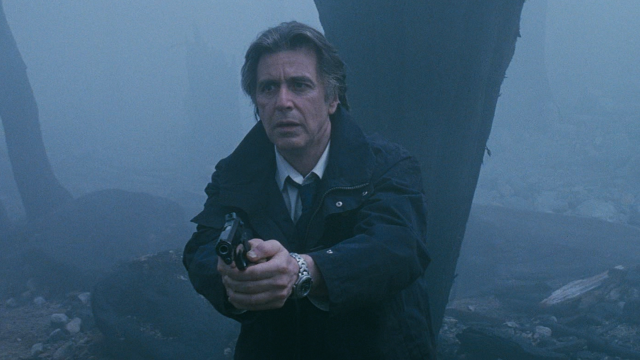Insomnia is Christopher Nolan in an unusual mode. It’s a fairly faithful remake of the 1997 Norwegian film, which means he’s guided by someone else’s vision–more so, arguably, than he was with his Batman trilogy. It’s unusually straightforward, without timeline trickery or reality-bending. It has big name stars, but they’re not his regular players. And it finds him at a very specific point in his career–he’s just established himself with Memento, but he’s yet to go on to get to the blank check-providing work on Batman Begins and The Dark Knight. The result is Christopher Nolan, blockbuster auteur, doing a meat-and-potatoes psychological thriller: familiar elements executed extremely well and with occasional invigorating strangeness.
I like this kind of thing. It makes good paired viewing: have either a Nolan night and go on to watch Dunkirk, a more seasoned Nolan effortlessly blending “WWII movie” and his own sensibility and fixations, or watch this and Inside Man, Spike Lee’s verve-y and inventive heist film. Insomnia may not be as purely delightful as Inside Man or as striking as Dunkirk, but it has a great weight to it. Nolan’s inability to fuck around works entirely in its favor: it’s a film where it feels like the making or unmaking of the characters’ souls is at stake. It’s serious and often uncanny without getting close to the punishing, po-faced grimness and labyrinthine bullshit of, say, Prisoners. In short, this is one of the ways to do genre right–not transcending it, but fulfilling its promises thoroughly and distinctively.
It’s no surprise that Nolan can handle suspense well, but it’s worth mentioning the cat-and-mouse game between Will Dormer (Al Pacino, only working in one classic Pacino shouting session) and Walter Finch (a subdued Robin Williams, working well–and unnervingly–against the grain). That’s a staple trope, but, again, it’s well-executed here, with the upper hand shifting around: no one becomes a mastermind, no one gets unrealistically stupid. The tension stays taut, and Dormer’s motivations remain just a little murky, even to him, which means it’s hard to predict exactly what he’ll do.
One of the top assets, though, is the landscape, a stark white and pale blue Alaska where the sun never sets. Nolan does a terrific job showing Dormer’s disorientation right from the start–he has to be reminded early on that no, they can’t go ask questions at a school right now, despite the broad daylight; it’s ten o’clock at night–and letting it fray still further over the course of the film, as he goes longer and longer without sleeping. It’s a great Pacino performance, perfectly capturing the sensation of exhaustion and a kind of increasing free-floating delirium; Pacino actually outshines Williams, which can be hard to do when a comedic actor goes dark, and that’s a credit to him–and to Williams and Nolan as well, with Williams’s quiet performance making the movie feel like it has its own reality and isn’t just a hearty “can you believe it?” gesture at the audience. In a world full of overwrought thrillers that confuse absurdity for grimness or winks and nudges for genuine deconstruction, sometimes it’s refreshing to have something played straight and honest, especially when it involves a director whose creativity is going to show in other ways.
Insomnia is streaming on HBOMax.

